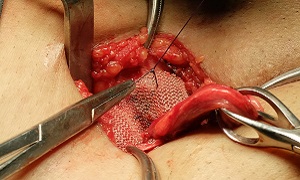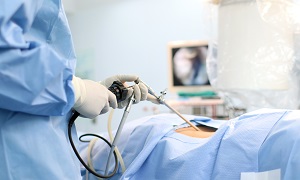Inguinal Hernia
When tissues like part of the intestine protrude through the weak abdominal muscles’ spot, an Inguinal Hernia occurs. The bulge causes pain when you bend, cough, or lift a heavy object. It is not mandatory that the condition is dangerous.
Causes of inguinal Hernia
Some cases of hernia don’t have a cause. For others, the causes may include:
- Straining during bowel movements
- Increased abdominal pressure
- Strenuous activity
- Chronic coughing
- A weak spot in the walls of the abdomen
- Pregnancy
- Straining during urination
- Chronic sneezing
Abdominal weakness leads to Inguinal hernia occurring at birth, in many women, because the lining of the abdomen doesn’t close properly. In some people, Inguinal hernia develops in the later stages of life when muscles weaken due to coughing accompanied by smoking or due to strenuous physical activity. The abdominal wall may also weaken later in life after abdominal surgery or injury.
The weak spot occurs in the inguinal canal at the place of entry of the spermatic cord into the scrotum in men. The inguinal canal has a ligament that holds the uterus in place in women. Hernia might also occur at places where the tissue surrounding the pubic bone attaches to the connective tissue from the uterus of an woman.
Symptoms of Inguinal Hernia
- A bulge on the sides of the pubic bone
- Aching or burning sensation in the bulge
- Weakness in your groin
- Pain in the groin
- Pain and swelling around the testicles
- Discomfort in the groin while bending over, lifting or coughing
- Pressure in your groin
- A heavy sensation in the groin
Symptoms in children
Newborns and children suffer from inguinal hernia due to weakness in the walls of the abdomen present at birth. When an infant cries, the hernia is mostly visible at that time or when the baby coughs or strains during bowel movements. The newborn may have less diet and behave irritably. A hernia is more apparent when the child coughs or strains during bowel movements in older children or while standing for a longer duration of time. Troubling signs:
- Fever
- A hernia bulger turning red, dark or purple
- Nausea, vomiting or both
- Quickly intensifying sudden pain
- The inability of the bowel movements
Diagnosis of Inguinal Hernia
A physical examination is a must for the diagnosis of an Inguinal hernia. Your doctor may check your groin area for the bulge. The doctor may also make you cough, stand, or put strain because hernia is more prominent during coughing or standing. You may need to undergo imaging tests, like MRI or CT scans if the diagnosis isn’t available readily.
Treatment options for Inguinal Hernia
Your doctor may recommend you to wait a while if the hernia isn’t small. He or she might also ask you to wear a supportive truss. Applying manual pressure is the natural method to reduce the bulge in children and prevent surgery. When the hernia is painful or enlarging, you will require surgery to get relief from discomfort and complications.
Open Hernia Repair
The procedure involves the use of local anesthesia and sedation, or general anesthesia. The surgeon will make an incision in the groin area and push the protruding part of the tissue into the abdomen. He or she will sew the weakened area with a synthetic mesh called hernioplasty. The doctor will close the opening with staples, stitches, or surgical glues.
Laparoscopic Repair
This is a minimally invasive procedure. It requires the use of general anesthesia. The surgeon will make several small incisions into your abdomen. He or she will use gas to inflate the abdomen and make the view of the internal organs easier. The doctor will insert laparoscopy through one of the incisions as it is a small tube with a tiny camera. He or she will next insert the instruments from other incisions with the help of the camera and repair the hernia with synthetic mesh.
You will experience less discomfort and scarring after the surgery and be able to get back soon to your daily routine. Laparoscopy allows your doctor to avoid scar tissue. This is a better choice for people with hernia present bilaterally. However, it may require a few weeks time for you to get back to your regular routine after the surgery.



